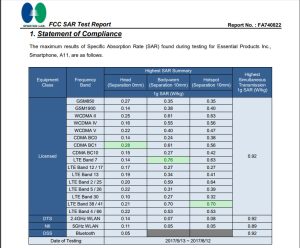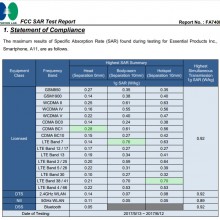Essential PH-1 Radiation Levels
[add_sar_ranking_update]
| Select a phone to compare SAR levels to other popular phones |
| Cell Phone Usage & Radiation Exposure | ||||||||||||
Essential PH-1 Safety Tip:How Much Will Turning Off Wi-Fi and Bluetooth Reduce Radiation?This SAR chart reveals how turning off Wi-Fi and Bluetooth on your Essential PH-1 can significantly reduce your exposure to radiation. Our SAR comparison chart shows that by simply turning off Wi-Fi and Bluetooth transmitters, you can lower the RF radiation exposure to your head by %, and you can lower exposure to the body by %, when considering these differences between cellular-only (Wi-Fi/Bluetooth OFF) and simultaneous use exposure (Wi-Fi/Bluetooth ON), a wise way to reduce excessive phone radiation is to tap off unnecessary transmitters when not in use! Additionally, when using your phone as a hotspot, turning off Bluetooth can reduce your exposure by up to % according to the FCC SAR report for device number 2ALBB-A11. Essential PH-1 SAR Levels
|
Key Takeaways
- Children vs Adults: Children have higher SAR levels due to thinner skulls and developing tissues, making them more vulnerable to radiation.
- Wi-Fi Impact: Simultaneous use of cellular and Wi-Fi transmission increases SAR levels for all age groups.
- Precautionary Measures: Using radiation protection products like QuantaCase can help mitigate these risks, especially for younger users.
By understanding these differences, parents and guardians can make informed decisions to better protect their children from excessive microwave radiation exposure, emphasizing the need for safer smartphone usage practices and protective accessories like QuantaCase.

| Children vs Adults Radiation Exposure |
The Specific Absorption Rate (SAR) of a mobile device measures the amount of radio frequency energy absorbed by the body during device usage.
The SAR values for the ph-1 (FCC ID 2ALBB-A11) are as follows:
- 0.28 W/kg when held at the head with cellular transmission only
- 0.76 W/kg when worn on the body with cellular transmission only
- 0 W/kg when used as a Hotspot or Airplay
- 0 W/kg when held at the head with simultaneous cellular and Wi-Fi transmission
- 0 W/kg when worn on the body with simultaneous cellular and Wi-Fi transmission
- when used as a Hotspot simultaneously with other transmitters active.
Essential PH-1 - SAR Levels
FCC SAR Levels
- FCC Approval Date This is the date the phone SAR test was completed before the phone's release to the public as required by law. 26 June 2017
- FCC ID The FCC ID is the code used to register a device for FCC compliance 2ALBB-A11
- Head SAR Level SAR test when held against your head when only using cellular service. Wifi and other transmitter are NOT active 0.28 W/kg
- Body SAR Level SAR test when held against your body only using cellular service. Wifi and other transmitter are NOT active 0.76 W/kg
- Simultaneous Transmission The highest possible SAR recorded with ALL transmitters active, Cellular, WiFi, and Hotspot 0.92 W/kg
- Hotspot SAR The highest possible SAR test when held against your BODY using the phone as a hotspot with cellular and WiFi transmitters active, 0.70 W/kg
FCC ID: 2ALBB-A11 FCC Report on Essential PH-1
 According to test reports filed with the Federal Communications Commission (FCC), the Specific Absorption Rate (SAR) for the Essential PH-1 Smartphone is 0.28 watts per kilogram (w/kg) at your head, and 0.76 W/kg when worn on your body. The Essential PH-1 hotspot SAR is 0.70 W/kg. The SAR for simultaneous transmission (cellular plus Wi-Fi) for the Essential PH-1 is 0.92 W/kg.
According to test reports filed with the Federal Communications Commission (FCC), the Specific Absorption Rate (SAR) for the Essential PH-1 Smartphone is 0.28 watts per kilogram (w/kg) at your head, and 0.76 W/kg when worn on your body. The Essential PH-1 hotspot SAR is 0.70 W/kg. The SAR for simultaneous transmission (cellular plus Wi-Fi) for the Essential PH-1 is 0.92 W/kg.
All SAR levels reported to the FCC are averaged over one gram of body tissue corresponding to the maximum allowable level of 1.6 w/kg. Currently, the Essential PH-1 is only available on Sprint’s network. However, SAR levels will vary depending upon your specific cell phone carrier (e.g., AT&T, Sprint, T-Mobile, or Verizon).
It’s important to know the minimum separation distance for body-worn testing was 10 mm, that requires a smartphone user to maintain slightly more than 3/8 inch minimum separation (10 mm = 0.39 in) for SAR safety compliance.





